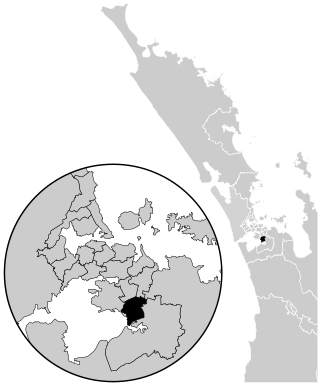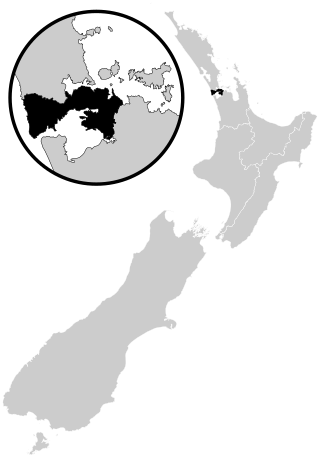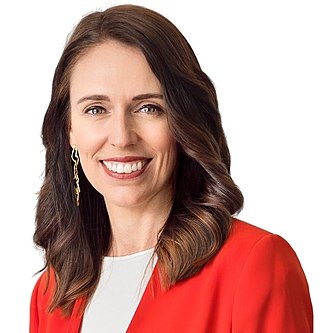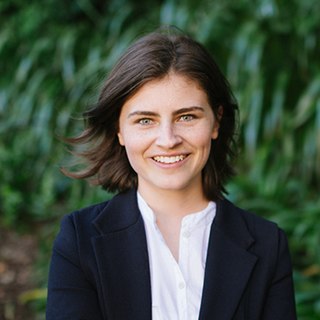
Manurewa is a New Zealand parliamentary electorate in southern Auckland. A very safe Labour seat, the seat was created in 1963 and has returned a National MP only once, in 1975. Arena Williams has represented the electorate since the 2020 election.

Tāmaki Makaurau is a New Zealand parliamentary Māori electorate returning one Member of Parliament to the New Zealand House of Representatives. It was first formed for the 2002 election. The electorate covers central and southern Auckland, and southern parts of western Auckland. It derives its name from the Māori-language name for Auckland; Makaurau is a descriptive epithet referring to the value and desirability of the land.

New Conservatives is a conservative political party in New Zealand. Some opponents and observers have described the party's policies as far-right, though the party now states it has moved to a "more centrist" position under new leadership. It advocates for lower taxation, anti-abortion measures and austerity cuts.
The New Zealand Outdoors & Freedom Party, formerly the New Zealand Outdoors Party, is a registered political party in New Zealand. It is part of the Freedoms NZ umbrella movement. The party is co-led by Sue Grey and Donna Pokere-Phillips.

The 2020 New Zealand general election was held on Saturday 17 October 2020 to determine the composition of the 53rd New Zealand Parliament. Voters elected 120 members to the House of Representatives, 72 from single-member electorates and 48 from closed party lists. Two referendums, one on the personal use of cannabis and one on euthanasia, were also held on the same day. Official results of the election and referendums were released on 6 November.

Chlöe Charlotte Swarbrick is a New Zealand politician. Following a high-profile but unsuccessful run for the 2016 Auckland mayoral election, she became a parliamentary candidate for the Green Party of Aotearoa New Zealand, standing in the 2017 New Zealand general election, and was elected as a member of the New Zealand Parliament at the age of 23. In the 2020 election, Swarbrick was elected as the Member of Parliament for Auckland Central, becoming the second Green Party MP ever to win an electorate seat, and the first without a tacit endorsement from a major party leader. She retained Auckland Central in the 2023 election. In March 2024, she was elected co-leader of the Green Party. Swarbrick is Green Party Spokesperson for Mental Health, Drug Law Reform, Revenue, Climate Change, and Finance.
Leighton James Baker is a New Zealand political candidate and businessman. He was leader of the New Conservative Party from 2017 to 2020, and has contested every general election since 2008, initially for the Kiwi Party, without success.

Anahila Lose Kanongata'a is a New Zealand social worker and politician. She served as a Member of Parliament for the Labour Party from 2017 to 2023.

Agnes Loreta Loheni is a New Zealand politician and a former Member of Parliament in the House of Representatives for the New Zealand National Party. She was declared elected on 31 January 2019, following the resignation of Chris Finlayson.
This page lists candidates contesting electorates in the 2020 New Zealand general election.

The Advance New Zealand Party was a short-lived political party in New Zealand from 2020 to 2021. The idea was first unveiled in a newsletter from founder Jami-Lee Ross in April 2020. Ross has claimed that the party was a centrist and anti-corruption movement designed to appeal to voters "in the middle"; however, their main policies represent the political fringe rather than centre.
NewZeal is a socially conservative political party in New Zealand, currently led by Alfred Ngaro.
The New Zealand TEA Party was a registered political party in New Zealand. The party was led by John Hong. The party contested the 2020 general election, but did not win any seats.
Donna Marie Pokere-Phillips is a New Zealand politician known for her conspiracy-driven views. She is the co-leader of the NZ Outdoors & Freedom Party.

Anae Neru Asi Tuiataga Leavasa is a New Zealand politician of the Labour Party. He served as the Member of Parliament for Takanini from 2020 to 2023.
The Attica Project was an unregistered political party in New Zealand.

Stephen Berry is a perennial candidate in New Zealand national and local politics, running on right-wing positions.

Jessica Hammond is a New Zealand public servant, perennial candidate, playwright, and blogger. Hammond stood for The Opportunities Party for Ōhāriu in the 2017, 2020, and 2023 general elections, coming third twice and fourth once.

Shai Navot is a New Zealand lawyer, former crown prosecutor, and leader of The Opportunities Party (TOP) between 2020 and 2022. She previously served as deputy leader of The Opportunities Party during the 2020 election.
This page lists candidates contesting electorates in the 2023 New Zealand general election.












